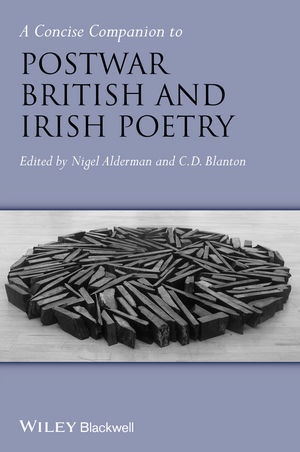Read more
Informationen zum Autor Nigel Alderman is Associate Professor of English at Mount Holyoke College C. D. Blanton is Associate Professor of English at the University of California, Berkeley Klappentext This volume introduces students to the most important figures, movements and trends in post-war British and Irish poetry.* An historical overview and critical introduction to the poetry published in Britain and Ireland over the last half-century* Introduces students to figures including Philip Larkin, Ted Hughes, Seamus Heaney, and Andrew Motion* Takes an integrative approach, emphasizing the complex negotiations between the British and Irish poetic traditions, and pulling together competing tendencies and positions* Written by critics from Britain, Ireland, and the United States* Includes suggestions for further reading and a chronology, detailing the most important writers, volumes and events Zusammenfassung This concise companion introduces students to the most important poetic figures, movements, contexts, and trends in post-war British and Irish poetry, providing a much-needed reference point in a sprawling and often contentious field. Inhaltsverzeichnis Notes on Contributors ix Acknowledgments xii Chronology xv Introduction 1 Nigel Alderman and C. D. Blanton 1 Poetic Modernism and the Century's Wars 11 Vincent Sherry How the experience of continuous war and the collapse of liberalism shape modernist poetry and the twentieth century as a whole, focusing on Ezra Pound, T. S. Eliot, W. H. Auden, and David Jones. 2 The Movement and the Mainstream 32 Stephen Burt How the poetry of the Movement established a dominant and continuing mode in postwar British poetry, with discussions of Robert Conquest's anthology New Lines, Kingsley Amis, Donald Davie, Thom Gunn, Elizabeth Jennings, Philip Larkin, Simon Armitage, Lavinia Greenlaw, Alison Brackenbury, and Peter Scupham. 3 Myth, History, and The New Poetry 51 Nigel Alderman Discusses the reaction of the 1960s and later decades to modernist myth-making and Movement antimodernism, exploring the problem of formulating a historical poetics, with attention to Philip Larkin, A. Alvarez's anthology The New Poetry, Sylvia Plath, Geoffrey Hill, Ted Hughes, Seamus Heaney, and Paul Muldoon. 4 Region and Nation in Britain and Ireland 72 Michael Thurston Surveys the poetry of peripheral nationalisms and regionalisms, concentrating on the oscillation between commitment and irony in Northern Ireland (John Montague, Ciaran Carson, Seamus Heaney, Paul Muldoon), Wales (R. S. Thomas, Tony Conran, Robert Minhinnick, Oliver Reynolds, Gillian Clarke), Scotland (W. S. Graham, George Mackay Brown, Iain Crichton Smith, Douglas Dunn, Raymond Vettese, Tom Leonard, Kathleen Jamie), northern England, and the Midlands (Tony Harrison, Ted Hughes, Jon Silkin, Geoffrey Hill, and Roy Fisher). 5 Form and Identity in Northern Irish Poetry 92 John P. Waters Charts three generations of poets in Northern Ireland, attending to the ways in which problems of identity have generated formal innovation, focusing upon Louis MacNeice, John Hewitt, and Patrick Kavanagh; Seamus Heaney, John Montague, Derek Mahon, and Michael Longley; Paul Muldoon, Ciaran Carson, and Medbh McGuckian. 6 Poetry and Decolonization 111 Jahan Ramazani Addresses the emergent poetic forms produced by newly independent postcolonial nations and the reaction of poets in the newly post-imperial British state, including discussions of Derek Walcott, Kamau Brathwaite, Lorna Goodison, Linton Kwesi Johnson, Grace Nichols, Bernadine Evaristo, Louise Bennett, Okot p'Bitek, Philip Larkin, Noel Coward, Tony Harrison, Christopher Okigbo, and Agha Shahid Ali. ...

